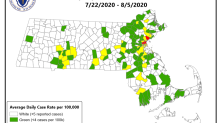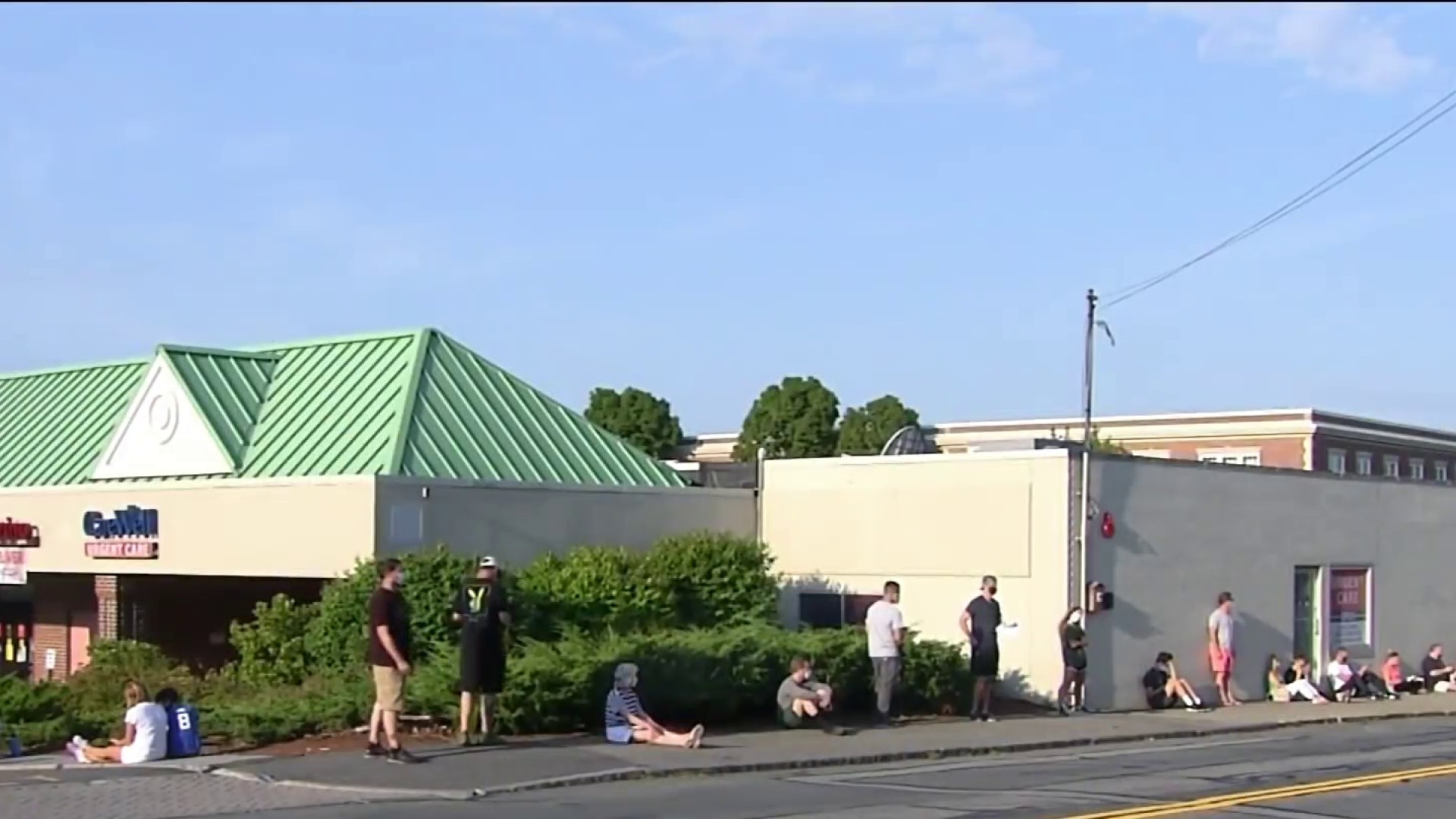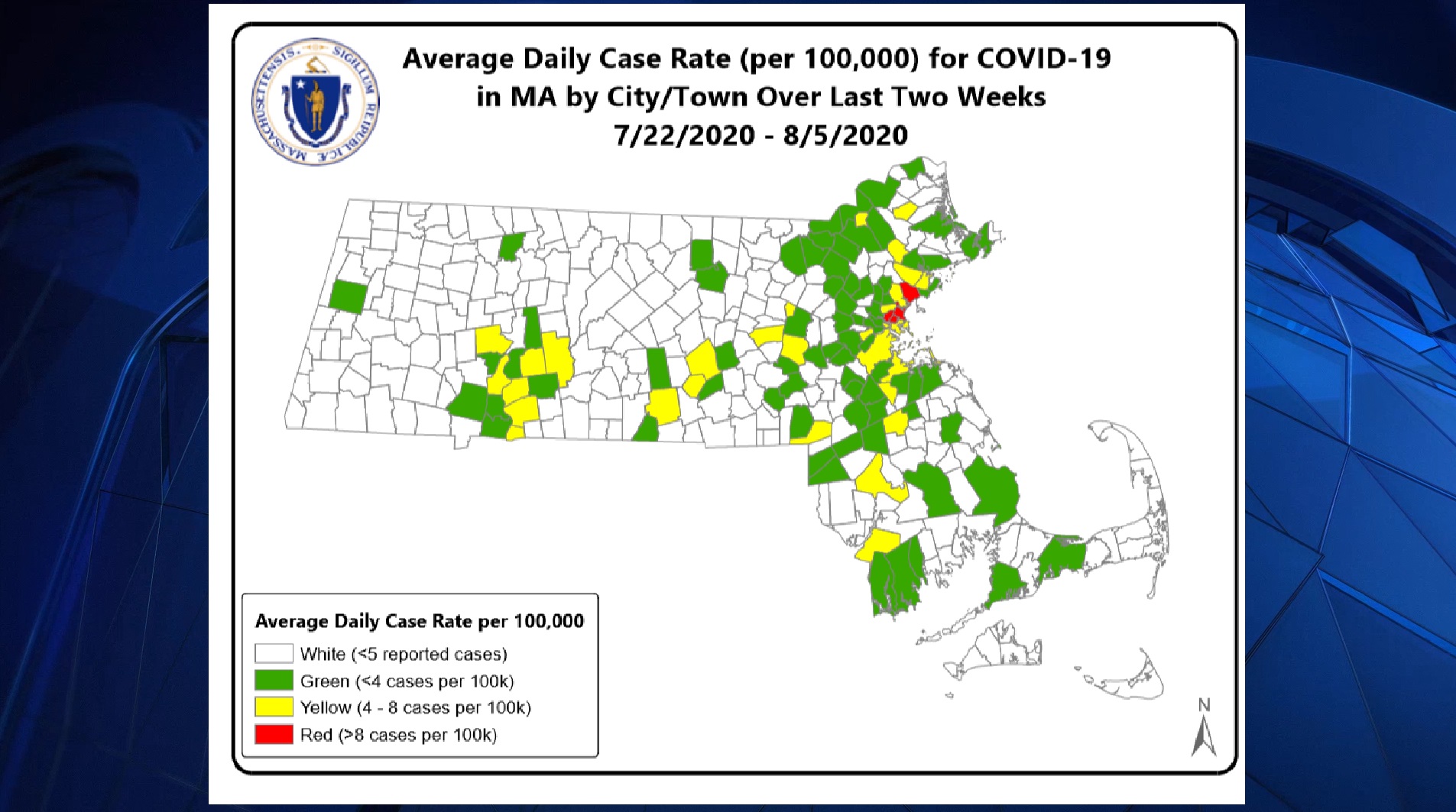Gov. Charlie Baker launched a new colored-coded system to label Massachusetts cities and towns based of the severity of their COVID-19 infection rates Tuesday, initiating a targeted approach to help contain the spread of coronavirus.
Chelsea, Everett, Lynn and Revere are included in the high risk, or "red," category, meaning they have over eight cases per 100,000 residents. Twenty-nine other communities, including Auburn, Belchertown, Boston, Brockton, Charlton, Chicopee, Fall River, Framingham, Georgetown, Granby, Holyoke, Hull, Lawrence, Longmeadow, Malden, Marlborough, Maynard, Middleton, Northampton, Peabody, Salem, Saugus, Springfield, Quincy, Randolph, Taunton, Winthrop Worcester, Wrentham, are in the moderate risk, or "yellow," category, meaning they have between four and eight cases per 100,000.

If you're not one of those 33 communities, you don't have to worry about any increased enforcement. In fact, Baker said residents in those "green" and "white" cities and towns should feel confident working toward some sort of in-person schooling this fall.
For those municipalities that were labeled as high or moderate risk, the increased attention will include enforcement efforts like increased police involvement, fines and cease and desist orders for businesses, along with intervention-based efforts like road signs, public service announcements and additional funding.
"The idea is not to issue fines," Baker said Tuesday. "We want to make sure they're abiding by the gathering rules and will be sending people home if they're not... No one's looking to arrest people and write citations unless people literally refuse to play by the rules."
Police are now authorized to enforce COVID-19 restrictions, picking up a task that previously had been under the purview of local boards of health.
Baker said enforcement of the gathering size limits is one way the state could help high- and moderate-risk communities, but he said he anticipated most of the citations or warnings would come as a result of people calling in complaints about businesses or parties, not random patrols or business spot checks.
The state is also offering to help cities and towns through a multi-agency COVID Enforcement and Intervention Team with road signs, public service announcements, reverse 911 calls or other communication strategies to remind residents to wear face coverings and practice good hygiene and distancing.
Parks, playgrounds and some businesses could also be restricted or shut down in moderate- or high-risk communities if they have been shown to be contributors to a municipality's higher infection rates, the governor said.
According to the state, the full range of enforcement and intervention efforts for high and moderate risk communities are expected to include:
- Targeted interventions and inspections by a range of member agencies, including the Division of Local Services, the Department of Labor Standards, the Department of Public Health, Massachusetts State Police and the Alcoholic Beverages Control Commission.
- Increased enforcement, including fines, of sector guidance for businesses to ensure businesses and residents are aware of and following COVID-19 orders.
- Cease and desist orders as necessary for businesses and organizations in violation of the COVID-19 orders.
- Support for the Alcoholic Beverages Control Commission and local licensing boards in exercising their existing authority to fine restaurants or suspend or cancel liquor licenses when restaurants do not comply with required COVID-19 safety measures or sanitation codes.
- Targeted public messaging to alert residents of higher risk COVID communities, including road signs, public service announcements and the use of reverse 911.
- Technical support to local government officials to support enhanced local COVID-19 prevention efforts such as assistance in accessing federal funding.
- Potential restrictions or shutdowns for parks, playgrounds, businesses or other entities and locations believed to be contributing to COVID-19 spread in higher risk communities.
- Additional public health support, such as testing, tracing and quarantining.
State House News Service contributed to this report.




